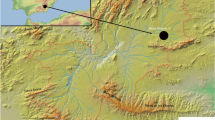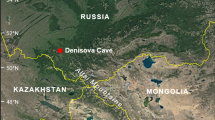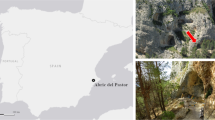Abstract
Recent excavation of the tuffs of the Laetolil Beds in Tanzania has revealed the presence of a large variety of footprints from the Pliocene. Many of these prints can be correlated with fossilised remains of Pliocene animals found in the same area.
This is a preview of subscription content, access via your institution
Access options
Subscribe to this journal
Receive 51 print issues and online access
$199.00 per year
only $3.90 per issue
Buy this article
- Purchase on Springer Link
- Instant access to full article PDF
Prices may be subject to local taxes which are calculated during checkout
Similar content being viewed by others
References
Leakey, M. D. et al. Nature 262, 460–466 (1976).
Kent, P. E. Geol. Mag. 78, 173–184 (1941).
Dietrich, W. O. Palaeontographica 94, 44–133 (1942).
Author information
Authors and Affiliations
Rights and permissions
About this article
Cite this article
Leakey, M., Hay, R. Pliocene footprints in the Laetolil Beds at Laetoli, northern Tanzania. Nature 278, 317–323 (1979). https://doi.org/10.1038/278317a0
Received:
Accepted:
Published:
Issue Date:
DOI: https://doi.org/10.1038/278317a0
This article is cited by
-
A Late Pleistocene hominin footprint site on the North African coast of Morocco
Scientific Reports (2024)
-
Arched footprints preserve the motions of fossil hominin feet
Nature Ecology & Evolution (2023)
-
Sharing food with hyenas: a latrine of Pachycrocuta brevirostris in the Early Pleistocene assemblage of Fuente Nueva-3 (Orce, Baza Basin, SE Spain)
Archaeological and Anthropological Sciences (2023)
-
The Thorny Issue of African Porcupines: a New Mandible of Hystrix makapanensis from Olduvai Gorge (Tanzania) and Rediagnosis of the Species
Journal of Mammalian Evolution (2022)
-
Tracking late Pleistocene Neandertals on the Iberian coast
Scientific Reports (2021)
Comments
By submitting a comment you agree to abide by our Terms and Community Guidelines. If you find something abusive or that does not comply with our terms or guidelines please flag it as inappropriate.



